
Reflecting Humanity Through the Performing Arts
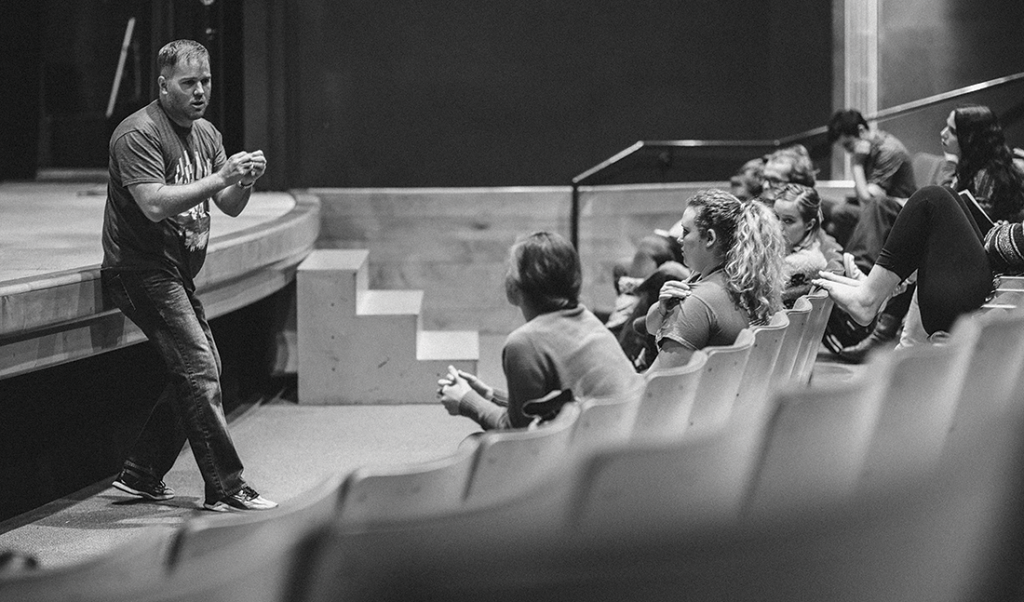
by Autumn Thatcher (MSC ’15)
Have you ever lost yourself so completely in the lyrics of a song, or in the movements of a dancer on a stage illuminated by a single light, that for a brief moment you felt you had been transported somewhere else? In those moments, you were able to escape whatever stress or bad feelings were plaguing you at the time. You watched the light reflect on the muscles of the dancer as they moved, their face wearing an expression that you understood—even though your body might not be capable of moving in that same way. You melted into the power of the vocalist’s song, their voice conjuring memories that made your heart viscerally react. The moments spent watching a performing artist can be pure and magical, offering a raw experience that allows viewers to forget the stresses of navigating life and get lost in what’s happening in front of them. More than an escape, performing arts offer a chance to connect with another human being in an authentic way. History is laden with dark times when humanity seems to be falling by the wayside. But often, light can be found during these times, and it comes in the form of art; the arts become more alive, ignited by the human need to tell a story through performance. At Westminster, performing arts students are encouraged to channel their own passions to tell a story—whether theirs or someone else’s—to reach people at the depths of who they really are.
Florence J. Gillmor was a music student at Westminster in the late 1930s. She remained committed to the fine arts long after her time at the college, and because she was the heiress of a very successful sheep and land owner, Florence received an inheritance that allowed her to support the passion she enjoyed exploring at Westminster. Over the years, the Florence J. Gillmor Foundation has given the college numerous generous donations: providing student scholarships; creating a school of music; and most recently, generously expanding the performing arts complex.
“Florence was one of the best clients I’ve ever had,” says James B. Lee, senior attorney and member of the Florence J. Gillmor Foundation Board of Directors. “She had a great capacity for involvement. She loved Westminster and made it clear when she was alive that she wanted a lot of her money to go to Westminster to help the music department—that was her love.”
Currently, the Jewett Center houses the theatre, music, and dance programs. It is a vibrant environment oozing art. But with the fine arts programs growing, an expansion is enthusiastically welcomed.
“Performing arts is a vital part of campus. In the wake of almost a universal decline in enrollment college campuses, the arts, certainly here at Westminster, have grown exponentially,” explains Jared Larkin, theatre professor and chair of both the theatre and dance programs.
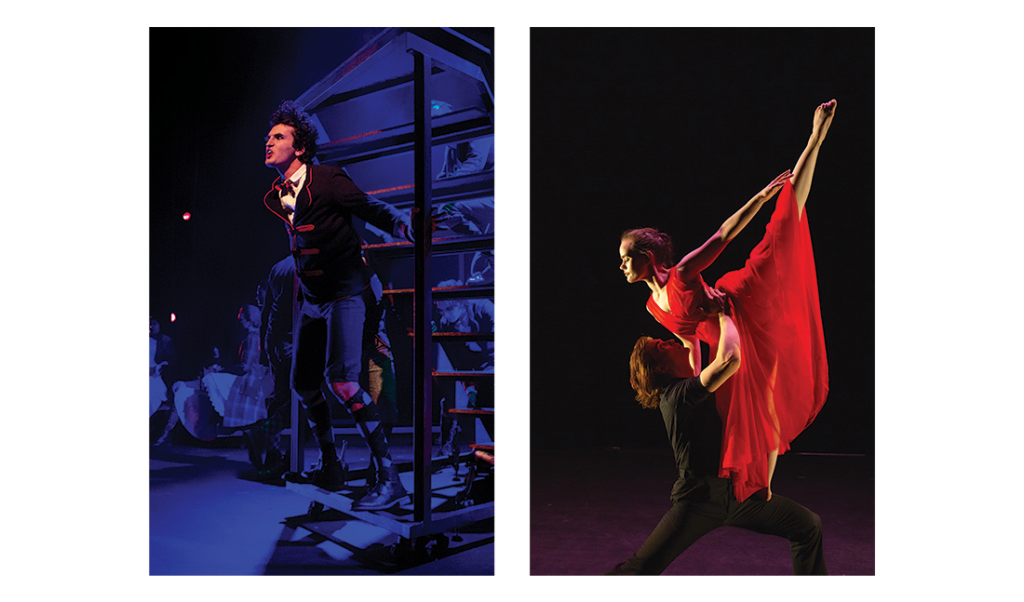
Faculty working with students in the performing arts are not surprised by the fact that, despite the increase in digitization and automation in our world, a need still exists for performing arts and the human connections they encourage. “The arts provide a sense of humanity in our lives,” says Chris Quinn, director of the Gillmor School of Music. “They are the best part of humanity. We do the arts not just for personal growth and the satisfaction of our egos for ourselves, but to give them away. They are a form of love, a form of giving, a form of sharing. In this day and age, with all the rhetoric that we have to listen to—and the violence we have to endure—the arts bring balance to our lives and bind us together.”
Jared agrees with Chris’s sentiment, adding that for theatre students, performing on the stage means diving into the essence of someone else’s story to represent it as sincerely as possible. As chair of the theatre program, Jared is working to ensure that the stories being told on Westminster’s stage are reflective of the experiences felt by all, including marginalized identities. “With really powerful movements, such as Me Too, Time’s Up, Black Lives Matter, and others, comes the story of people’s lived experiences—their lives and humanity—and who’s telling them? They are stories that need to be told,” Jared says. “It’s our privilege and sacred obligation to tell those stories in the most effective way possible.”
As the performing arts expand on campus, Jared says the programs that bring these performances to Westminster need to be more inclusive. “Something that I heard loud and clear when I became chair of theatre—especially from the Black Student Union—was that their voices were not being heard on our stages,” he explains. “Other underrepresented populations on campus—other persons of color, female voices, LGBTQ—didn’t feel that their stories were being told as much on our stages either. We have since changed how we pick what’s on our stages. We were doing a bunch of material by dead white men. Now for a play to even be considered for our season, a director has to defend, ‘Why Westminster? Why Westminster now? What is this saying about conversations that we may be having across campus, and how does it have representation on stage or off stage?’”
Honoring the lived experiences of human beings from all walks of life helps those involved in the performing arts better connect with their audiences—and, in some instances, requires the performers to confront their own biases and perceptions. Theatre arts alum Shianne Gray (Honors ’15) says that this opportunity does not belong solely to the person on stage: it crosses the floodlights into the audience, creating an energetic exchange. “Being able to either participate in storytelling or experience it as an audience member connects us as humans and shows us that we are more similar than we are different,” she says. “It teaches us empathy and helps us connect to people who are not like us. Really, that’s how we become better people.”
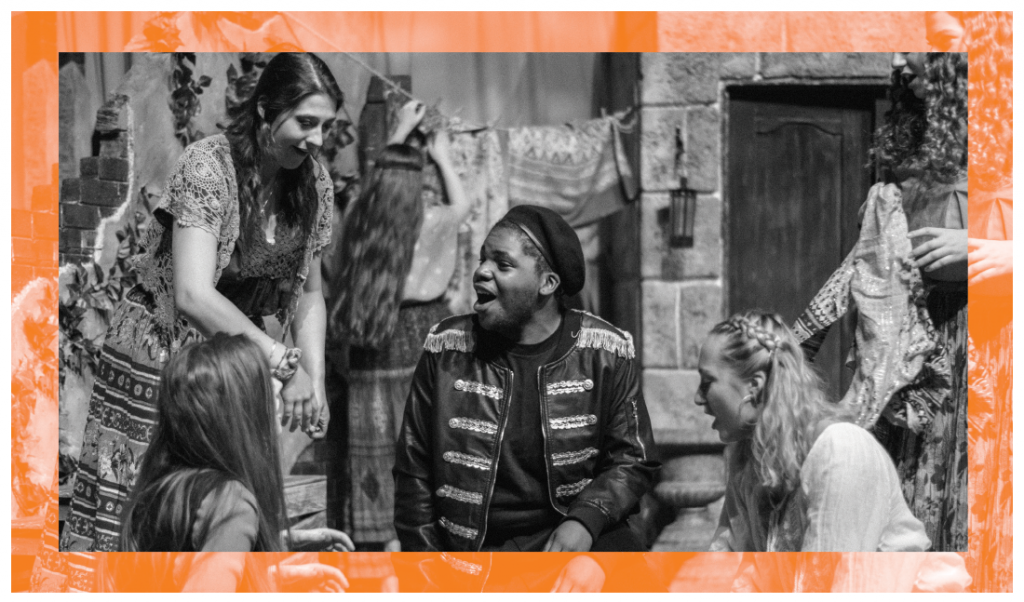
The expansion to the performing arts complex aims to help performing arts majors feel a sense of belonging on campus by providing the space to connect in a way that, to some degree, hasn’t yet been possible. Currently, dance majors do not have a dedicated space on campus where they can rehearse regularly. Students participating in dance often rehearse in the Ballet West studios in Trolley Square, which means that they spend much of their time off campus. Music students practice in rooms that are not soundproof and, in theatre, actors are either outside or in hallways rehearsing while other classes are in session. The expansion will provide over 13 new soundproof rehearsal rooms, a recital hall, an art gallery, a student lounge, and a costume shop. More importantly, performing arts students will have better access to pursuing their passions. The performing arts faculty also see the expansion as a way of elevating Westminster’s presence in the local community.
“This new addition will create a real distinct identity for the performing arts as a whole on this campus. Our identity in the community will really be solidified,” Chris says. “In Sugar House, there isn’t a strong performing arts identity other than Westminster College. In our immediate community, we are going to be a place for people to go to and know that they can come here for music, theatre, and dance.”
The performing arts programs at Westminster have all seen an increase in student enrollment, and faculty involved in these programs anticipate that this trend will continue. “It’s really important to know that across the nation there has been an expansion of performing arts,” says theatre professor and former dance program chair, Nina Vought. “We have really noticed a difference since the economic downturn in 2007 and 2008, when students recognized that the reason to go to college was not necessarily to make more money but to have a better life. That’s the purpose of education.”
Shianne says that she pursued many different options at Westminster before settling on theatre. “I made the decision to pursue that major because I realized that I could do whatever I wanted to do after college regardless of if I had specifically a theatre degree or an arts administration degree,” she says. “The specifics of that weren’t necessarily what mattered. It was the soft skills that are really important. Something the theatre department does a really great job of doing is helping students understand how to spin skills used in a theatre degree into any field. I felt very prepared to go out and get a job in the world.”
Since graduating from Westminster, Shianne, who is pursuing an MFA in arts administration at Southern Utah University, worked as the festival director for the Great Salt Lake Fringe Festival, which she co-founded with Nina and Michael Vought while still a student, and has worked in administrative roles for various nonprofits. She currently works behind the scenes for the Utah Shakespeare Festival. In her future career as an arts administrator, Shianne wants to help strengthen the connection between audience members and artists.
“The stereotypical idea of success is being an actor who is well known and does film work or is on Broadway. That is a very small percentage of the working actors out there,” she says. “I want to raise the general understanding of the work that goes into the performing arts and how big the scope is. It is a much more collaborative field. I really consider everyone who has a hand in the creation of art to be a valuable part of the artistic process.”
Part of being a liberal arts college means that students are provided ample opportunity to become well-rounded and experience every area of education. Non-theatre majors can participate in acting, just as non-music majors are invited to play their instruments or sing alongside music-major peers. At the same time, students focusing on a degree in performing arts are taught skills that translate into careers beyond the stage.
“There are many, many different forms that a performing arts degree can take beyond college,” Jared says. “Lighting designers will light for dance projects, conventions, or cruise ships, to give a few examples. Actors are working with doctors on their bedside manners. In dance, this is critical because a dancer has an expiration date. The body is only going to do certain movements for so long. You have to rely on the things that a liberal arts education gives you.”
Jared adds that the different paths performing arts majors take contribute to local economies. “When we look at markers for a healthy economy, the arts are always in the center of it. When an area is being revitalized, arts are generally an inherent component of that process.”
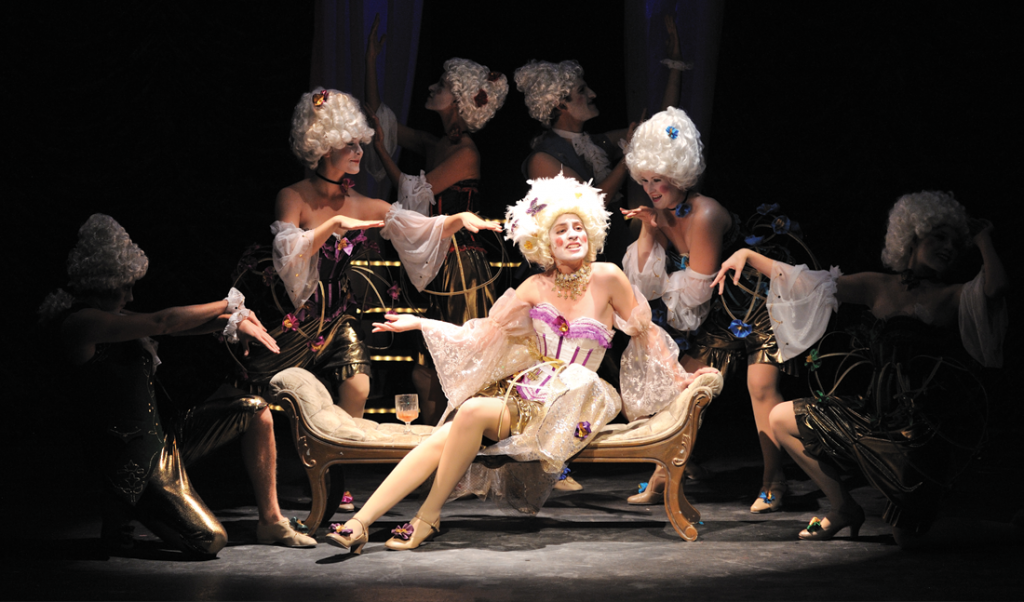
But performing arts also contribute to a healthy individual. They create a sense of community for those who may feel as if they have none. They take and they give; they envelop what it means to live. Florence Gillmor understood this, and those familiar with Westminster’s performing arts programs know that their presence on campus is essential to what it means to be Westminster.
“Having theatre and performing arts present on a campus is invaluable. It opens people up to live performances, which expand knowledge and discussion, and opens people to different points of view that they might not have had otherwise,” says Westminster alum Patrick Kibbie (’00), an accomplished actor and director based in Salt Lake City. Patrick minored in theatre at Westminster and went on to pursue a career as a journalist. After spending many years writing professionally, he returned to the stage full time. Patrick says that theatre has changed his life, and he believes that it has the ability to affect others in the same way.
“The energy, excitement, and drama that come from a live performance—you can’t get that anywhere else. Live theatre is energy in itself,” he says. “Movements have begun in theatre, and I think people should take advantage of such a thing.”
Performing arts faculty hope that an increased presence on campus will encourage students not participating in Westminster’s performing arts to do just that. “With performing arts on campus, we widen that band of what is an academic discipline. When we think that only science has value, we tend to discount the value of art. And yet, all good science has an element of art in it, like all good performing arts have an element of science. They’re very much intertwined—inextricably,” Nina says. “The performing arts reflect humanity—in a way hold a mirror up—so that we can see ourselves in our absurdities and our potential for genius and brilliance.”
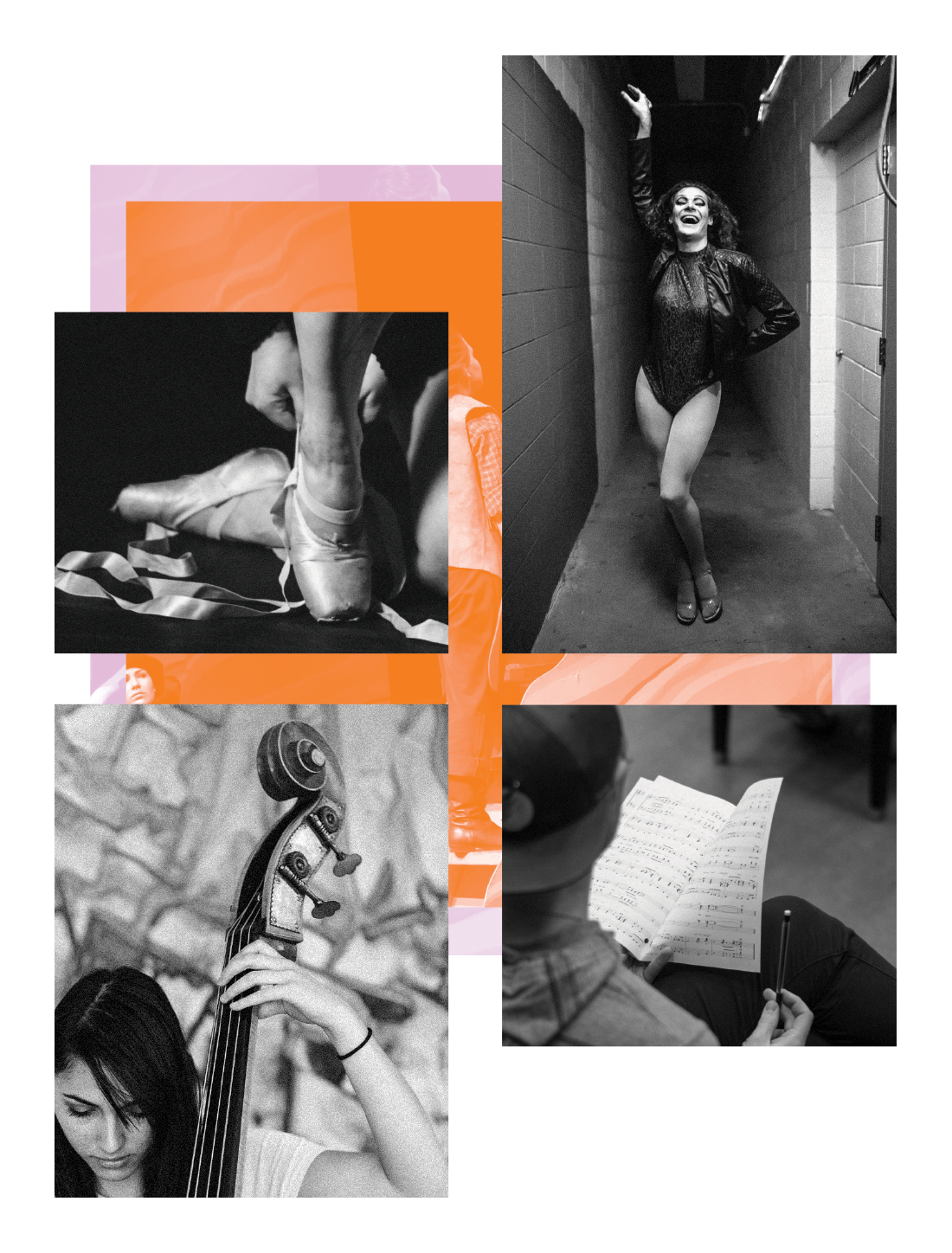
About the Westminster Review
The Westminster Review is Westminster University’s bi-annual alumni magazine that is distributed to alumni and community members. Each issue aims to keep alumni updated on campus current events and highlights the accomplishments of current students, professors, and Westminster alum.
GET THE REVIEW IN PRINT STAY IN TOUCH SUBMIT YOUR STORY IDEA READ MORE WESTMINSTER STORIES